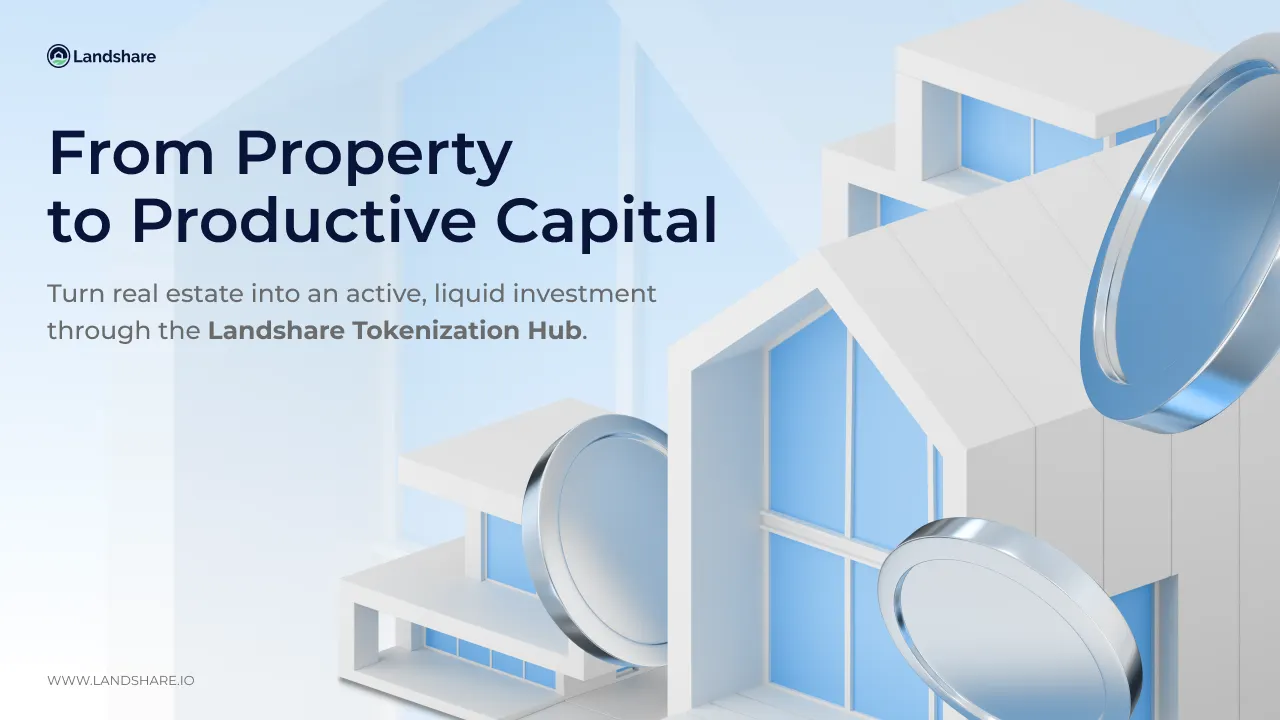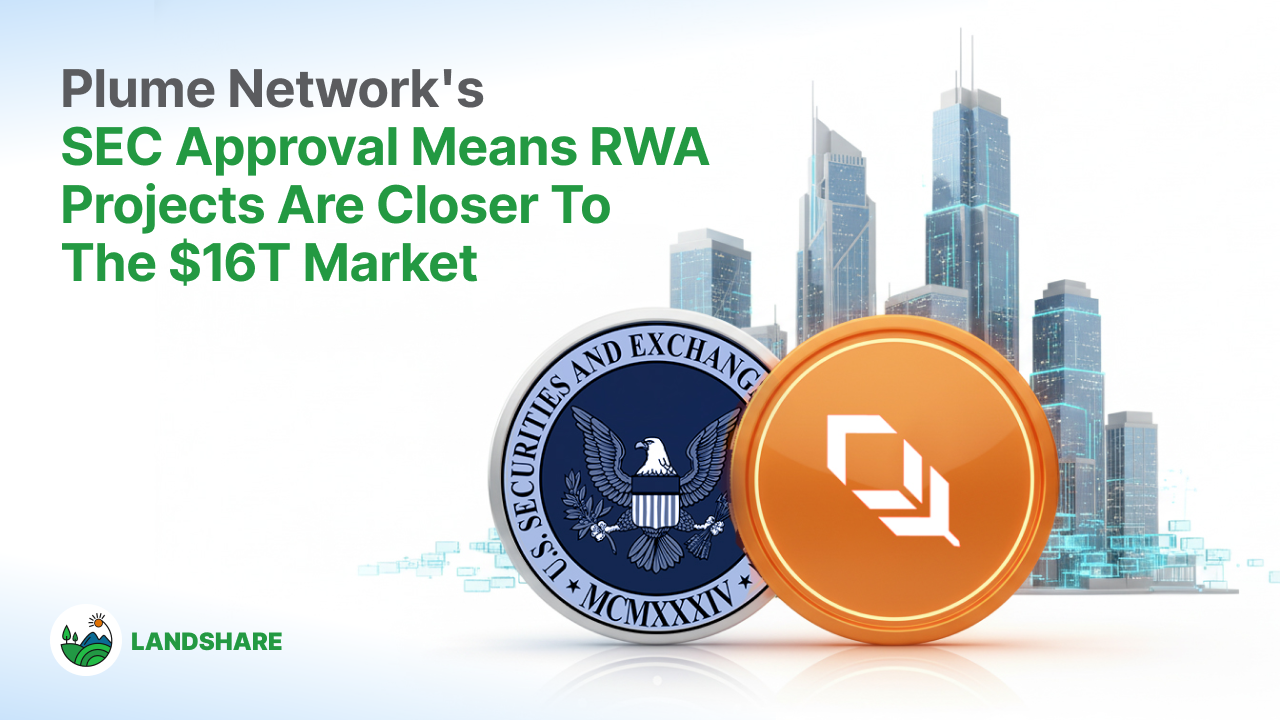How Secondary Markets for RWAs Transform the Real Estate Landscape
Landshare Team

The advent of blockchain technology heralds a seismic shift in the real estate sector, promising unparalleled liquidity and accessibility through tokenizing real-world assets (RWAs). Traditionally we have seen the real estate sector as an illiquid asset class with high entry barriers but now it is reimagined by integrating on-chain secondary market trading of RWA tokens.
According to CoinMarketCap, the market cap of real-world asset (RWA) tokens stands above $53.7 Billion. This substantial market cap shows us that the RWA sector in the crypto market is proliferating. The high pace of growth ensures that it will soon overlay a notable portion of the traditional real estate market.
We can see how the RWA narrative has taken crypto space by the storm, and it has made a massive leap in the financial landscape. It is making tangible financial assets such as real estate investments more fluid, transparent, and accessible to a broader spectrum of investors. The amalgamation of RWA tokens with secondary market trading brings unprecedented advantages for you in the highly lucrative real estate investment sector.
What Is Secondary Market Trading?
We can understand secondary market trading as trading of assets among buyers and sellers rather than with the companies or projects. A budding project in the crypto space launches a token through either an ICO, IEO, or IDO, which primarily trades native tokens in exchange of raising funds from investors. After the launch, when these tokens are up for trade among traders, it becomes a secondary market, and the trading becomes secondary market trading.
NYSE and NASDAQ are, for instance, secondary market trading platforms, as they offer you to trade or invest in stocks. On the same note, trading on both centralized and decentralized crypto exchanges falls within secondary market trading. We can trade Bitcoin on crypto exchanges such as Coinbase or buy or sell Ethereum on decentralized exchanges like Uniswap.
How Does RWA Token Secondary Market Trading Affect the Real Estate Sector?
Real-world assets (RWAs) refer to objects possessing tangible or intangible value, including but not limited to gold, fine art, and real estate. In 2024, the scope of these assets linked to the real world is set to broaden beyond the confines of physical space. The advancement of blockchain technology makes the expansion possessive, providing a unique on-chain identity to traditional assets. This innovation creates a novel concept known as the real-world asset token.
The global real estate market is over $630 Trillion today and is continually growing. It is expected to hit $729 Trillion by 2028. This also makes real estate investments one of the most lucrative investment vehicles due to huge returns, but they do come with their own shares of hassle.

The real estate market is illiquid, and even a single transaction of buying or selling a property could take weeks or even months. In addition, it takes time to complete the extensive paperwork required for a transaction, making the whole process inefficient.
With the introduction of real estate-backed RWA tokens, real estate property transactions can now be carried out faster, more transparently, and more efficiently. There's more to the phenomenon than just that; let's delve into the benefits of trading RWA tokens in secondary markets.

- Fractional Ownership: A Gateway to Enhanced Liquidity: The concept of fractional ownership, enabled by RWA tokens, demystifies real estate investment, allowing for the division of property into purchasable tokens. This approach significantly lowers investment thresholds, inviting participation from a wider demographic. The fractionalization of assets thus catalyzes market liquidity, with smaller investment portions facilitating quicker and more frequent transactions.
- Streamlining Transactions: The Efficiency Paradigm: Blockchain technology accelerates the transaction process, cutting through the red tape that often encumbers real estate dealings. The traditional weeks-long wait for deal closure is condensed into transactions that can settle in minutes or hours, thanks to smart contracts and on-chain verifications. This efficiency not only boosts market liquidity but also enhances the appeal of real estate as an investment vehicle, promising quicker returns on investment.
- Global Market Access: Expanding the Investor Pool: Tokenization propels real estate into the global market, offering investment opportunities beyond geographical confines. This global accessibility attracts diverse investors, further invigorating market liquidity. The borderless nature of blockchain facilitates an influx of capital from international investors, diversifying the investment base and stabilizing the market against local economic fluctuations.
- Democratizing Real Estate Investment: The democratization of real estate investment through tokenization is perhaps its most revolutionary aspect. By breaking down financial barriers to entry, RWA tokens open the real estate market to small and medium investors, previously sidelined by the substantial capital requirements of property investment. This inclusive approach broadens the investor spectrum and instills a more dynamic and participatory market environment.
- Cost Efficiency: Reducing the Financial Burden: Implementing smart contracts and eliminating intermediary fees through blockchain transactions lead to significant cost reductions. These savings extend to buyers and sellers, making investments more attractive and accessible. Furthermore, the reduced costs associated with transactions and management of real estate investments ensure a more efficient allocation of resources, optimizing returns for investors.
- Security and Transparency: Building Trust: Blockchain's inherent transparency and security features play a pivotal role in building investor confidence. Each transaction's immutability and transparent record of ownership and transactions mitigate the risks of fraud and unauthorized transactions, fostering a secure investment landscape.
Project Making Noise In The RWA Segment
As mentioned above, the RWA crypto tokens already have a market cap of billions of dollars. Several projects are spearheading change within the space with unique propositions and offerings.
Landshare ($LAND) is among the rare projects that offer real estate-backed RWA tokens: Landshare RWA ($LSRWA). $LAND is the native utility and governance token that takes care of transactions and other operations over the platform.
The RWA token represents the unit of the pool of real estate properties 1:1. Landshare makes it possible for you to step into tokenized real estate investments with as low as $1. Landshare RWA tokens are playing a crucial role in changing the real estate investment landscape with unique propositions and offerings.
Landshare is actively tackling the challenge of the lack of secondary trading options for most security tokens with a comprehensive three-pronged approach. The strategy includes on-chain valuations, ensuring transparency with up-to-date property valuations and cash reserves; fixed price liquidity, maintaining token value alignment with the underlying assets through controlled sales; and DEX Trading, aiming to foster a vibrant secondary market for LSRWA tokens by enabling unrestricted trading.
The upcoming listing of LSRWA Tokens on the DS Swap Security Token DEX is a significant milestone in this endeavor for Landshare. The on-chain real estate trading by offering instant settlements, no transaction fees, and the flexibility to trade against LAND or stablecoin pairs will be possible and it's a paradigm shift in making.
The introduction of the DS Swap listing is expected to amplify trading dynamics by providing zero-fee liquidity pools, facilitating arbitrage opportunities, and allowing for higher trading limits. Landshare takes a leap in resolving the liquidity issues with the DS Swap Security Token DEX listing, promising a more fluid and accessible market for real estate tokenization.
Further enriching the ecosystem, Landshare plans to propose an LSRWA-USD liquidity pool, akin to the successful LAND-BNB LP, to incentivize LSRWA holders with rewards for contributing to liquidity. This initiative not only aims to elevate LSRWA's utility but also to broaden the trader base, mitigate price volatility, and ensure a more stable and liquid market environment.
The Path Forward: Innovation and Opportunities
The tokenization of real estate assets paves the way for innovative investment models and financing mechanisms, from crowdfunded investments to yield-generating real estate funds. These developments promise to enrich the investment landscape and provide property owners and developers with novel avenues for funding and growth.
The listing of LSRWA Tokens on the DS Swap Security Token DEX represents a pivotal moment for Landshare, a huge change in on-chain real estate trading. Enabling instant settlements, zero transaction fees, and versatile trading against LAND or stablecoin pairs, this step will bring unprecedented liquidity in the space. It amplifies trading dynamics with zero-fee liquidity pools, arbitrage opportunities, and higher trading limits, marking a significant step towards solving liquidity issues and enhancing the accessibility of real estate tokenization.
RWA tokens' on-chain secondary market trading sets the stage for a more liquid, inclusive, and dynamic real estate market. By leveraging the power of blockchain technology, the real estate sector is poised for a transformation that promises to redefine the essence of property investment, making it more accessible, efficient, and attractive to a global audience of investors.
The future of real estate investment is not just about owning property; it's about being part of a revolutionary movement toward a more democratized financial ecosystem.
Landshare October Recap
Landshare Team
October was a milestone month for Landshare – one that set the stage for the next era of on-chain real estate. From the official Landshare v2 announcement to new ecosystem updates, governance decisions, and exciting community initiatives, we’ve laid the groundwork for a future defined by growth, utility, and innovation.
This month, we introduced the framework that will redefine how investors, property owners, and DeFi users interact with real estate on-chain. Let’s recap the highlights 👇
Landshare v2 Announcement
The official unveiling of Landshare v2 signaled the start of a new chapter – one built around real utility, real yield, and real scalability.
Landshare v2 isn’t just an upgrade. It’s the foundation of a self-sustaining ecosystem where tokenized real estate finally reaches its full potential. The new system transforms stable assets into active yield-generating opportunities, seamlessly connecting traditional markets to DeFi.
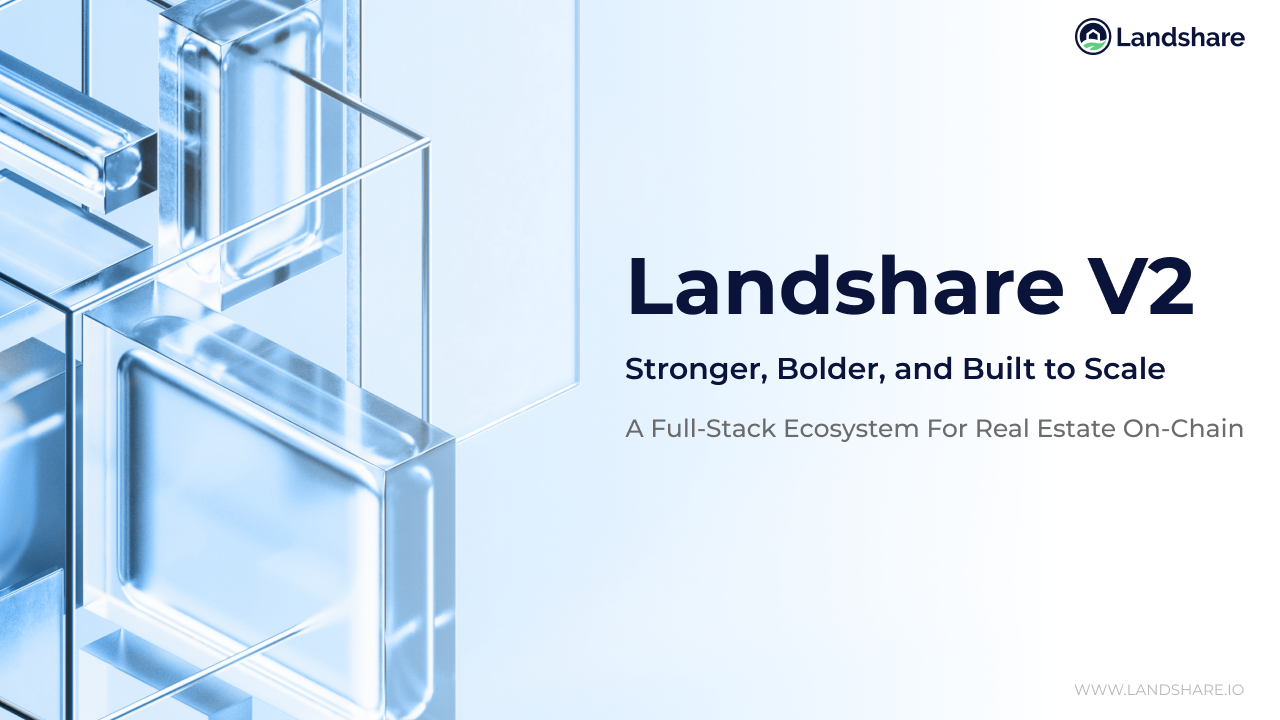
The Three Pillars of Landshare v2
In our follow-up deep dive, we explored the three core pillars that form the foundation of Landshare v2:
- The Real Asset Vault (RAV): A seamless gateway for stablecoin holders to earn real yield backed by tokenized properties.
- The Tokenization Hub: A complete solution for property owners to bring their assets on-chain.
- The DeFi Suite: Tools and incentives that amplify participation and utility across the ecosystem.
Together, these pillars create a self-sustaining growth loop, where every user and property strengthens the entire network.
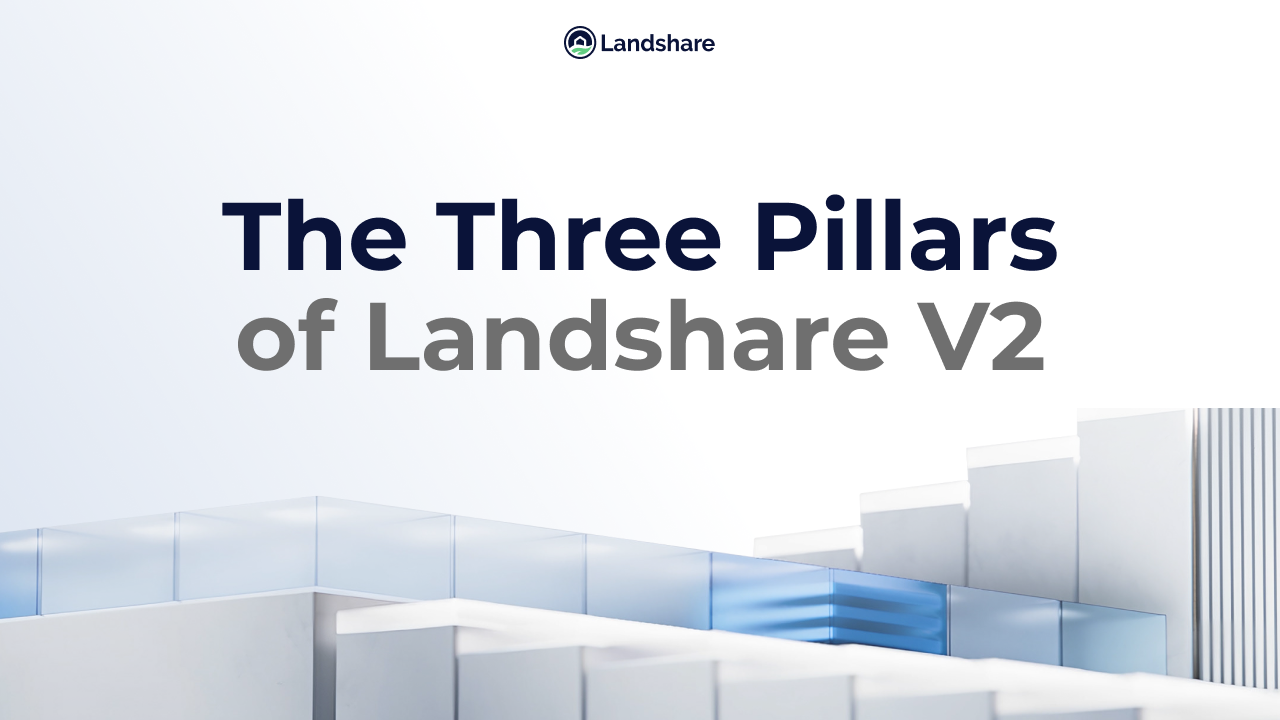
DAO Proposal Passed
In late October, the community voted to reduce LP emissions by 50% across both the LAND–BNB and LSRWA–USDT pools – with the proposal passing at 62.28% in favor.
This important step helps:
✅ Reduce daily LAND inflation
✅ Strengthen token scarcity and price stability
✅ Extend the reward pool lifespan
✅ Encourage long-term liquidity participation
The change will take effect within 48 hours of approval and marks another move toward a more balanced, sustainable economy for Landshare v2.
🗳️ View the full proposal and results
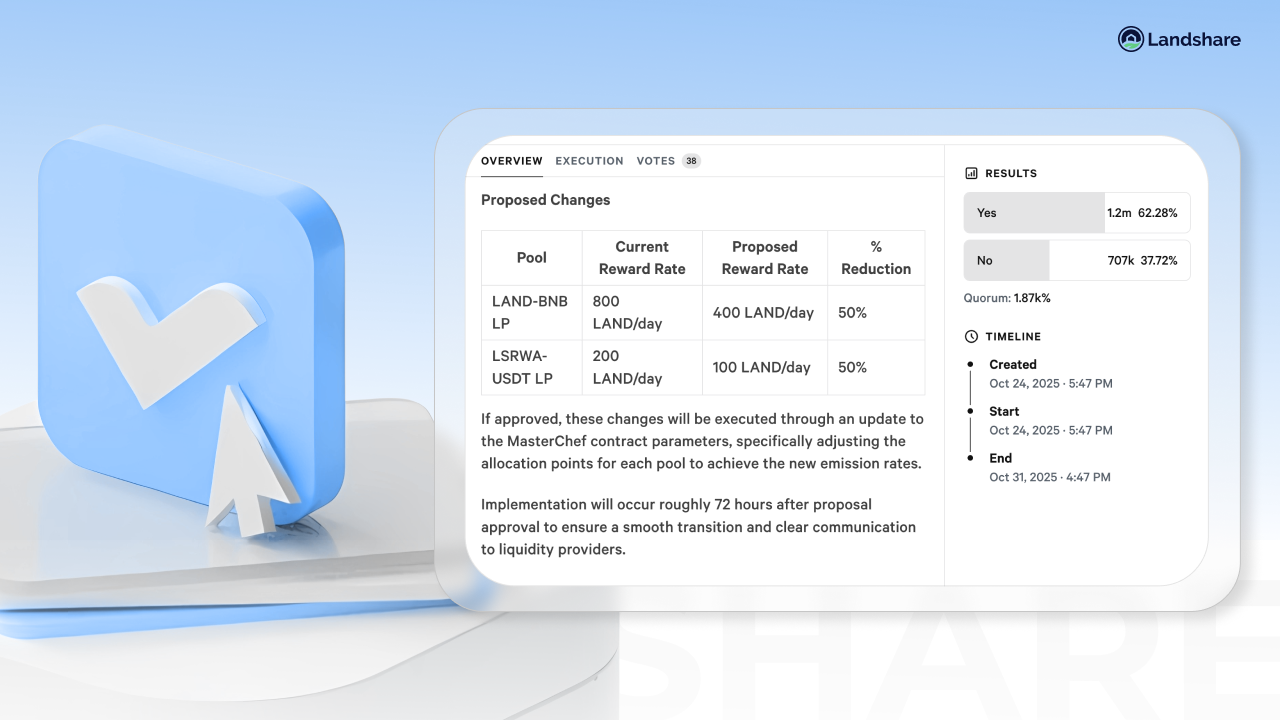
Tokenization Hub Breakdown
We released a comprehensive guide to the Landshare Tokenization Hub, explaining how property owners can now go beyond simple tokenization to access real investors, liquidity, and on-chain utility.
The Hub bridges traditional real estate with blockchain finance – creating a pathway for real-world assets to generate ongoing yield, transparency, and accessibility.

4.5M+ LAND Staked
October also marked another key milestone – over 4.5 million LAND tokens (nearly half of the total supply) are now staked in vaults. This incredible community achievement reflects growing confidence in Landshare’s long-term vision and token utility.
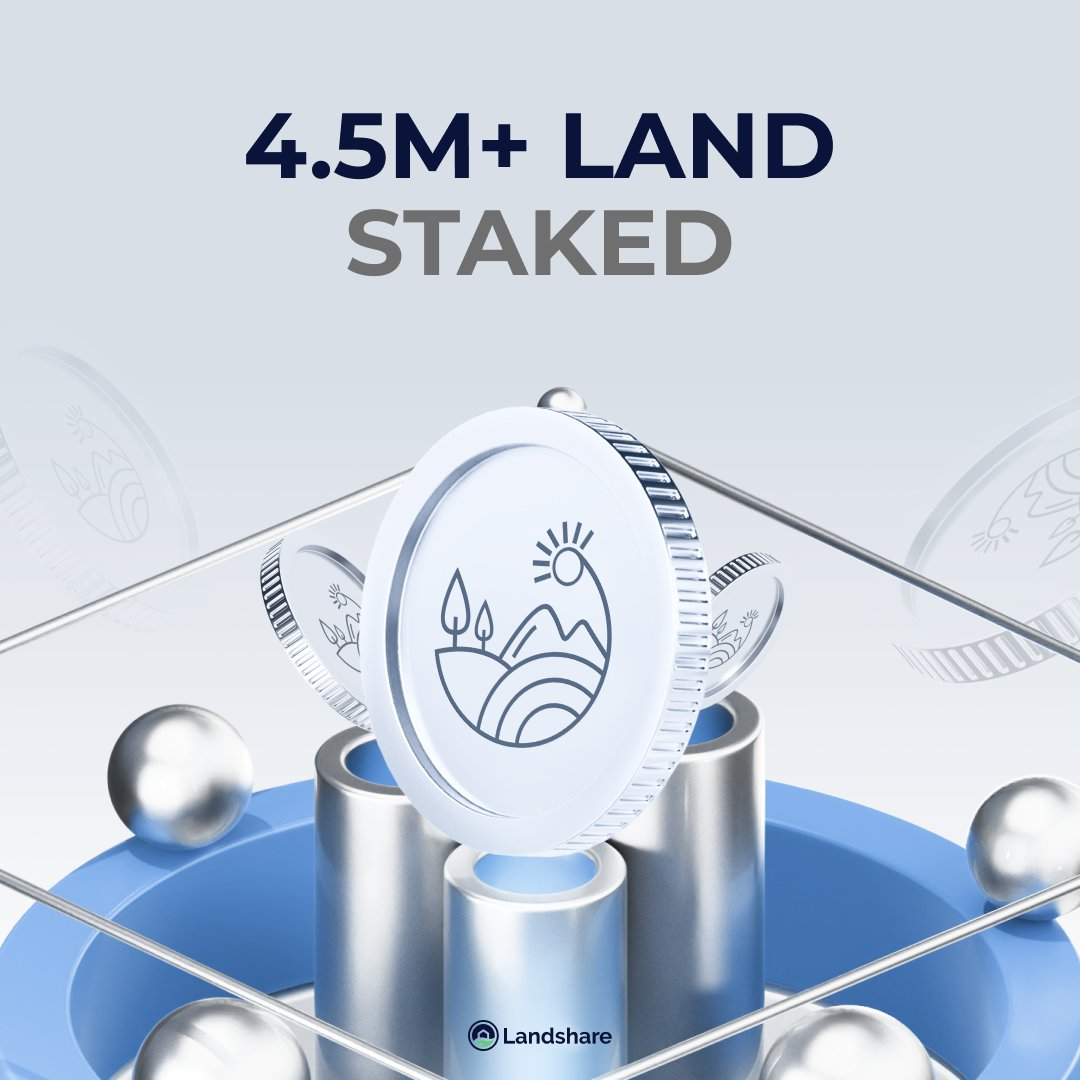
Community Townhall Incoming
We’re excited to announce our next Community Townhall, happening Thursday, November 6 at 12 PM CST or 6 PM CET on X Spaces!
Join Jordan (CEO), Travis (Co-Founder), and Ivan (CMO) as they discuss everything happening with Landshare v2, recent DAO proposals, and take your questions live.
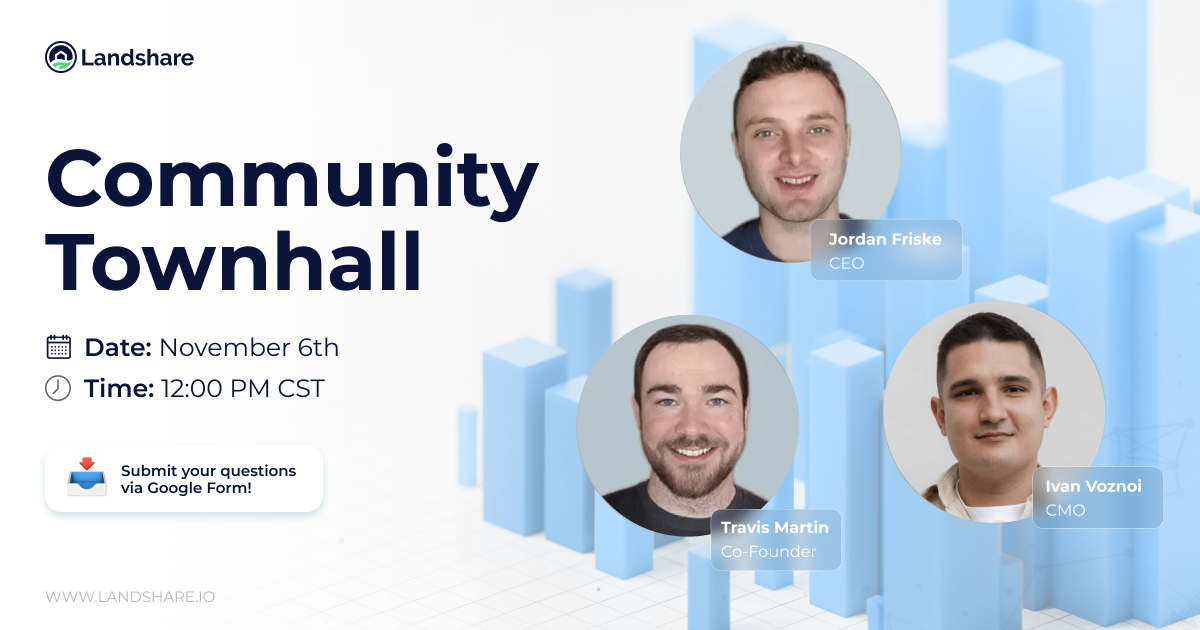
Looking Ahead
With Landshare v2 on the horizon, the foundation is set for a new phase of growth and adoption. In the coming weeks, we’ll be sharing more details on the RAV launch, the Points Campaign, and other major milestones driving our ecosystem forward.
Stay tuned – the future of real estate is being built on-chain, and we’re just getting started.
Tokenization Hub Breakdown
Landshare Team
Real estate tokenization has been a buzzword for years. Yet in practice, most projects have failed to move beyond press releases and empty promises. Too often, blockchain has been used as a veneer to package illiquid or low-quality assets, leaving investors with tokens that serve little purpose and property owners with no meaningful results.
Without investors, liquidity, or secondary markets, tokenization becomes little more than an on-chain spreadsheet — a digital record of ownership that no one can trade or invest in. For property owners, that means time and money spent “tokenizing” without achieving key goals: raising capital, expanding visibility, or unlocking value.
A Smarter Path Forward
For real estate tokenization to truly work, it needs to deliver tangible investment outcomes. After years of building and refining on-chain real estate products, Landshare has developed a model designed to do exactly that.
The Landshare Tokenization Hub transforms tokenization from a passive concept into an active investment process — connecting high-quality properties with real investors, liquidity pathways, and a live blockchain economy.
The Tokenization Hub Solution
Most platforms stop once a token is created. Landshare’s Tokenization Hub goes further , offering a complete pathway for property owners to bring their assets on-chain and immediately engage investors.
Each project is structured for success from day one, with:
- Customized tokenization models tailored to each property
- Transparent fundraising mechanics with defined soft and hard caps
- Built-in integration with the broader Landshare ecosystem
By connecting directly to Landshare’s existing network of investors and DeFi infrastructure, offerings can attract participation as soon as they launch. Once a fundraising goal is met, property tokens are deposited into the Landshare RWA Pool, linking them to ongoing liquidity, yield mechanisms, and secondary market exposure.
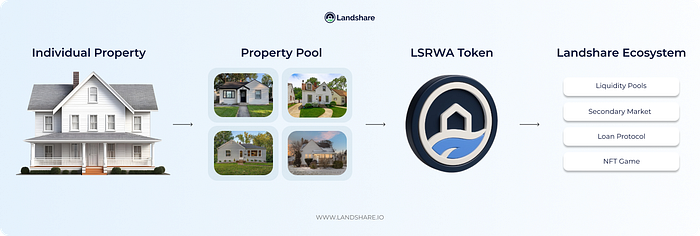
Why This Model Delivers Real Results
Where others leave property owners to manage marketing, compliance, and liquidity alone, the Tokenization Hub handles these as part of a unified process. This integration dramatically increases the likelihood of meeting fundraising goals and sustaining long-term engagement.
Integration with the Landshare RWA Token (LSRWA) is central to this model. Rather than isolated tokens with no market, each property becomes part of a shared, liquid environment that generates yield and investor participation. Individual assets can still be represented, extracted, or traded independently when needed.
For example, a multifamily property owner might tokenize 20% equity to raise $500,000 on-chain, connect the asset to the RWA Pool for ongoing yield, and maintain full transparency for investors — all within a compliant, accessible framework.
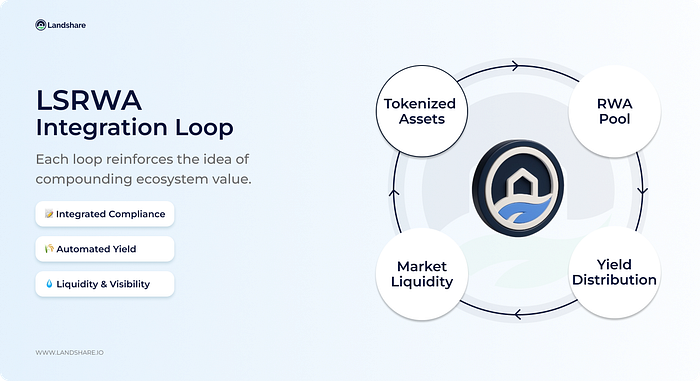
How It Works
- Tokenize the Property: Landshare collaborates with property owners to create a digital representation of equity, income rights, or hybrid participation.
- Launch the Offering: The property is listed on the Tokenization Hub with defined terms, caps, and transparent investor access.
- Fundraising & Validation: Investors participate directly on-chain. Once the soft cap is reached, funds are secured and the offering is finalized.
- Ecosystem Integration: Tokens are deposited into the Landshare RWA Pool, and investors receive LSRWA tokens representing pooled value and yield potential.
- Ongoing Value Creation: Property owners gain lasting benefits through liquidity, visibility, and investor engagement. As new assets are added to the pool, owners can rebalance between equity and cash, making real estate a more dynamic and liquid asset than ever before.

Built for Real-World Impact
The Landshare Tokenization Hub is more than a technical service — it’s a complete ecosystem designed to make real estate investment active, liquid, and accessible.
For property owners, it offers a streamlined way to raise capital and connect with global investors.
For investors, it provides exposure to yield-generating, on-chain assets backed by transparent real-world value.
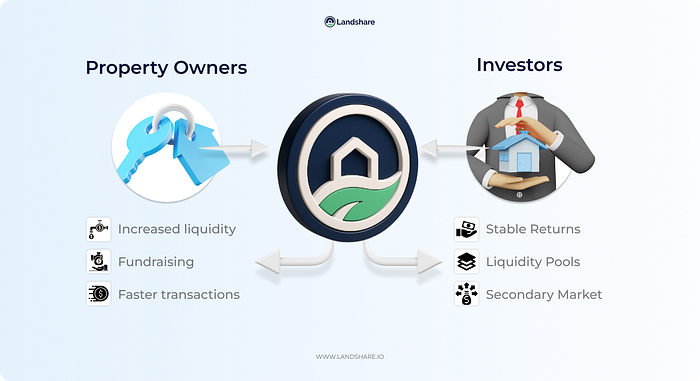
In an industry crowded with static tokens and overhyped promises, the Tokenization Hub delivers what tokenization was always meant to achieve — real outcomes, real liquidity, and real-world results.
🏡 About Landshare
Landshare is a tokenized real estate ecosystem that enables seamless investment in real-world assets on the blockchain. With Landshare, you can own a share of a real-world property simply by holding our RWA Tokens ($LSRWA). Our platform offers a secure, transparent, and efficient way to invest in real estate without traditional barriers.
- Website: landshare.io
- Twitter: @Landshareio
- Community: t.me/landshare
Plume Network's SEC Approval Means RWA Projects Are Closer to the $16T Market
Landshare Team
On October 6, Plume Network announced on its social media that it had been approved to be an SEC-registered transfer agent. This is a big milestone for the RWA industry, signaling that the traditional financial system is welcoming tokenized assets.
Transfer agents basically manage important back-end work and are the official record-keepers for securities issuers. So, essentially, they maintain shareholder registries, record ownership changes, issue certificates, and handle other corporate actions.
Plume’s approval means these critical functions can now be managed on-chain for tokenized securities. This is a pretty big deal, as it gives Plume and its users formal regulatory standing under U.S. law for on-chain securities.
Experts believe that this approval can boost the global RWA market, and top players like Landshare can benefit from it due to the increased regulatory clarity.
Why is the SEC’s Approval Important for Plume Network?
So, first, understand the roles of a registered transfer agent to get a better understanding of its importance.
In traditional finance, a transfer agent is usually a company or bank that tracks who owns a company’s securities and facilitates trades. They ensure every share transfer, stock split, or dividend payment is accurately recorded and reported. Now, let’s understand how this traditional role will work in the world of blockchain.
Post Link
By replicating these roles on-chain, Plume’s platform can securely log every token sale or dividend distribution in an immutable ledger, while also syncing with regulators. As Plume explains, its transfer-agent protocol will “link cap tables and reporting directly to SEC and DTCC systems”.
This means tokenized equity and debt on Plume can behave like traditional securities, but will be managed better with the help of blockchain technology.
Plume’s CEO believes that this regulation “exists to protect investors’ rights as shareholders,” and Plume’s on-chain solution is meant to simplify the processes under that framework.
Its Impact:
Experts believe that the registration will open up several doors for the RWA market because of the ‘trust factor’. Being registered means there are no risks as far as legality is concerned. When an industry or its top player receives a green flag from the government regulatory agencies, institutional capital follows.
BlackRock, Fidelity, JP Morgan, etc., are already looking to build blockchain-based products. This will further invite them to join the RWA growth story and possibly super-boost it.
Moreover, another important benefit is that tokenized securities can now flow through compliance obstacles. This means issuance times can be cut from months to weeks with the help of smart contracts. Similarly, on-chain dividends and ICOs can enjoy the same legal protections as Wall Street offerings.
What Does This Mean For The RWA Market?
Plume’s win comes at a time when analysts are already forecasting a massive growth in tokenized RWAs over the next decade. Institutions now value tokenization as a way to digitize everything from private credit to real estate. Also, the numbers are pretty optimistic as well.
A Boston Consulting Group report estimated the global asset-tokenization market could reach about $16.1 trillion by 2030. The industry has already grown by almost 380% in the past three years. To put things into perspective, today’s entire crypto market cap is smaller than those figures. Even some of the more conservative forecasts still show multi-trillion growth.
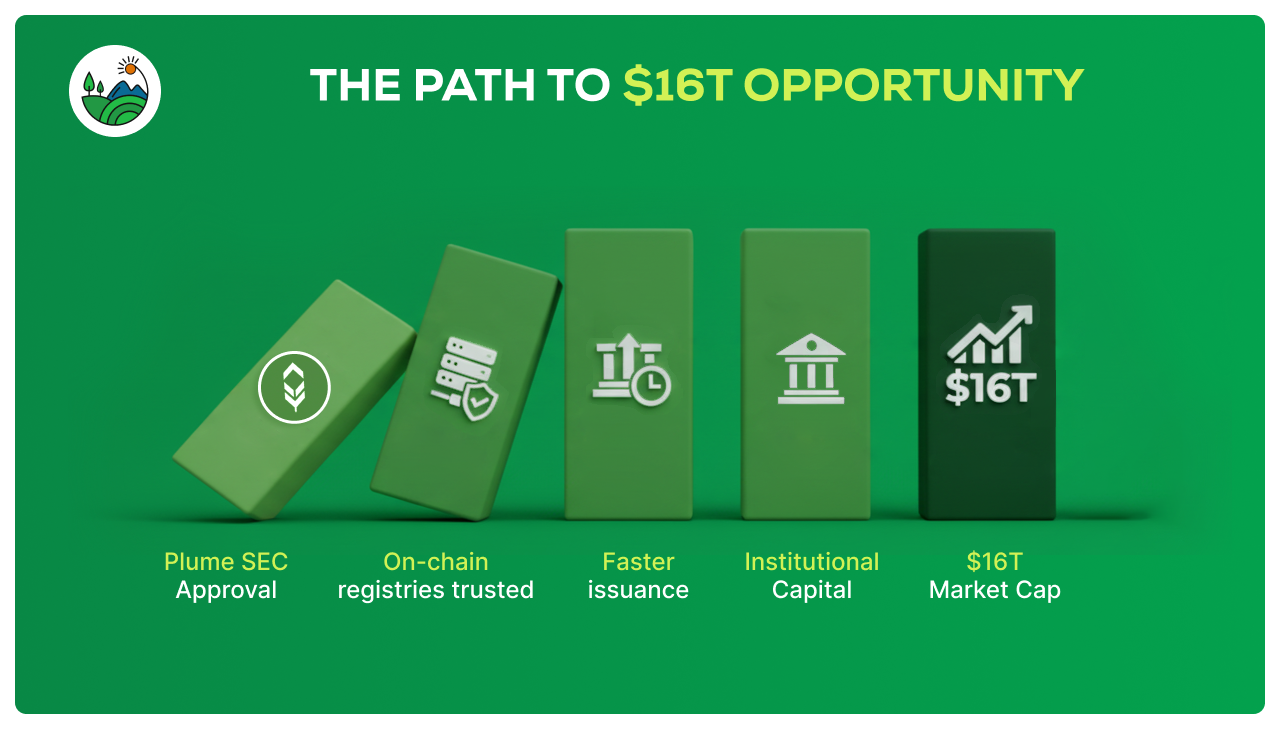
If these estimates can materialize in the days to come, RWA is well-positioned to be one of the largest markets in the world of modern finance.
Moreover, the external conditions are favoring this industry. Governments and regulators worldwide are creating proper frameworks. For instance, Asia-Pacific markets are running pilots for digital bonds and crafting standardized rules for security tokens.
These developments and the excitement of retail investors in this category build confidence that the $16T opportunity is actually very real.
How Will Landshare Benefit From This?
Landshare stands at the forefront of benefiting from this opportunity because of its early entry and real-world utility. This is very important as institutions seek new projects that have use cases that can help them capture a considerable market share.
Moreover, Landshare already operates as a compliant RWA platform. For instance, each Landshare RWA Token (LSRWA) is a security token representing fractional shares of a U.S. real estate portfolio, and buyers must pass KYC/AML checks.
The fact that regulators are now approving on-chain transfer agents shows the industry’s efforts are finally paying off. Here are some more factors that can help Landshare be one of the top RWA contenders:
1. Regulatory Credibility: Plume’s SEC status essentially means that tokenized securities can operate within established rules. Landshare’s approach aligns with these principles. So, investors can be assured that their projects sit within a legal framework designed to protect shareholders.
2. Investor Confidence: Every step toward clear regulation lifts confidence. The recently passed GENIUS Act, the SEC’s staff statements on liquid-staking, and the Trump administration’s overall outlook towards the crypto market have been fairly positive.
Similarly, Plume being approved as a SEC-registered blockchain transfer agent tells retail and institutional investors that projects like Landshare aren’t mere experiments. They’re rather a part of a regulated financial evolution.
Moreover, it means regulators see value in on-chain tokens, and that kind of signal helps legitimize the space Landshare operates in.
3. Landshare’s Own Progress: Landshare isn’t about hype. It is rather focused on delivering value from day one. The project has already sold four houses on the BNB chain. It is also providing consistent rental returns to the investors in its properties.
Moreover, the team remains focused on delivering stable, compliant returns from real estate growth.
Conclusion
So, now we know that the recent news was about more than just Plume Network being approved by the SEC to be a transfer agent. It rather has a much bigger impact on the RWA market as a whole.
While the industry continues to grow, for Landshare, it is the right time to innovate further and add more value to consumers’ lives.






